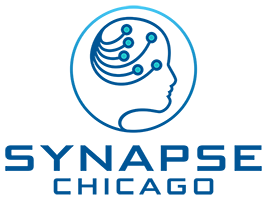Fighting depression one step at a time
Finding light in the dark
Symptoms of depression are as individualized as the person, and its impacts can range from manageable to disabling. For some, it manifests as a lack of energy that impedes one’s abilities at work and home. For others, it is an overwhelming sadness that dominates one’s thoughts, lending to a constant feeling of hopelessness or helplessness. Depression affects a person both psychologically and physiologically. Synapse Chicago approaches each case individually to determine the most effective options to help you.

Understand your Options
Being depressed is more than a feeling of unhappiness. It’s a serious condition, but depression can be treated. Medication is often prescribed, but in many cases, treatment stops there. At Synapse Chicago, we provide options that can work in combination with medication, or serve as an effective drug-free alternative.
Let us help you find your path
If you or your loved one is experiencing symptoms of depression, know you are not alone. Depression has become one of the most common mental illnesses in the world, and rates are on the rise. More than just a mood, depression can interfere with everyday enjoyment in life. At Synapse Chicago, we are dedicated to finding effective interventions as unique as the individual.

The science behind fighting depression
With a spectrum of ways to assess and treat individual forms of depression, Synapse Chicago provides a program that works for you and your individual needs.
Tailored for each person, we start a discussion to get to know you and your goals and may suggest a quantitative EEG – or “brain map.” These findings take the guesswork out of it, and may indicate neurofeedback, psychotherapy, or a combination of both may be beneficial. We will help you find your way out of depression so that you can live a life that feels more whole and rewarding
THE PHYSIOLOGY
Neurofeedback offers a science-based approach to treating depression. Because depression has many forms, the QEEG helps identify brainwave patterns specific to the individual and their associated symptoms. It utilizes the idea of neuroplasticity to reinforce positive connections and minimize negative ones. Once we have a “map” to help guide us, we can begin to chart a course to “exercising” your brain away from these depressive patterns.
THE PSYCHOLOGY
The “software” of the mind is the pattern of our thoughts. These are influenced by our own unique experiences, relationships, and coping mechanisms. Traditional talk therapy, Cognitive Behavior Therapy, and mindfulness are among the treatment approaches we call upon that have been proven effective for relieving symptoms of depression, so that you can regain control of your life and become your optimal self.
